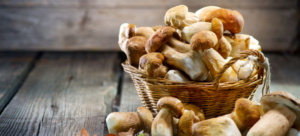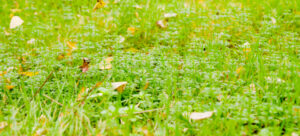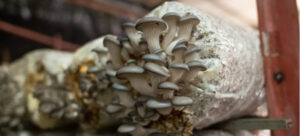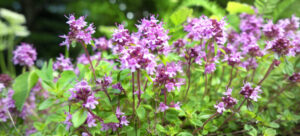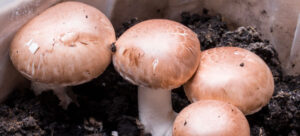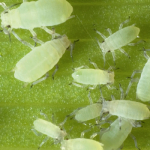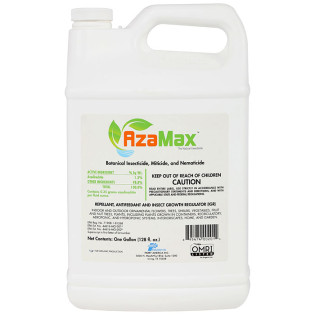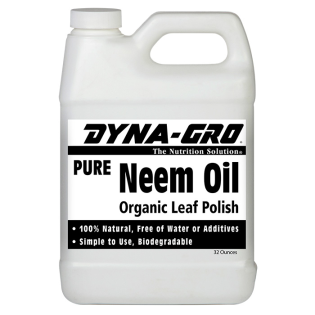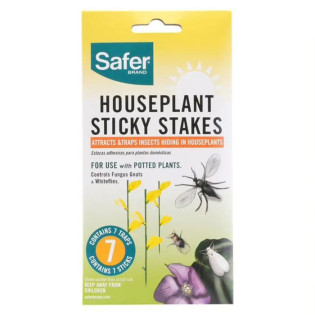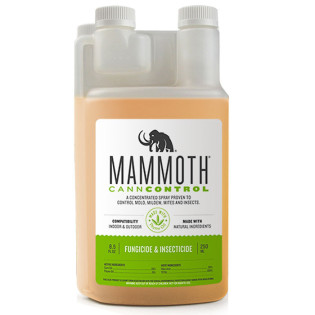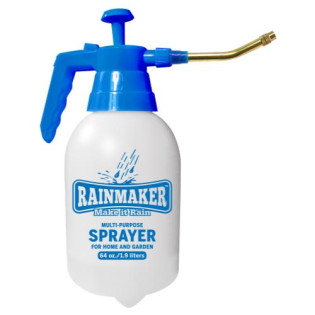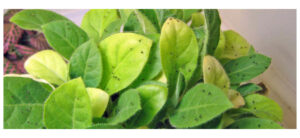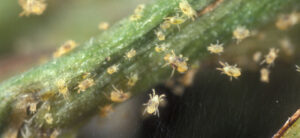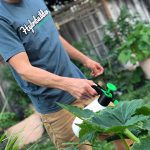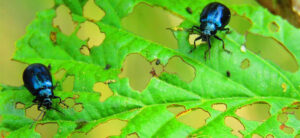
Learning how to get rid of aphids on plants can be the difference between saving your garden or scrapping it, hoping for better luck next time.
Whether you're growing veggies, flowers, or any other plant you can think of - these are perhaps some of the most common garden pests you'll encounter. These pests don't discriminate between indoor or outdoor gardens, but one thing is certain - they will wreak havoc on your plants.
In this guide, we will teach you how to get rid of aphids on plants if you do find them, along with how to prevent them in the first place. But first, we need to answer the simple questions of what are aphids, what do they do, and how do you identify them. Early detection is key in learning how to get rid of aphids permanently, so let's dive in.
What are aphids?
First and foremost, what are aphids?
Aphids are small, green bugs that can quite literally suck the life from your plants. They have tiny (less than ⅛”), pear-shaped bodies and are very fragile beings. They have a long beak that functions as a straw to consume your plant.

While they are most often green, certain species of aphids can appear yellow, orange, gray, black, or even white. Black aphids and white aphids are notoriously common in the garden. All aphids have specialized mouths that are able to easily suck the fluids from your leaves and flowers.
While they are more typical in outdoor grows, they can infest an indoor grow as well. Don't worry, we'll cover how to get rid of aphids on indoor plants, too.
Not all aphids have wings, but some develop them later in their life cycle once they have sucked a host plant dry and need to move on to a new meal. That's how they are able to quickly overtake your garden - they are voracious feeders.
Why You Need To Learn How To Get Rid Of Aphids On Plants
You may be wondering why we feel it is so important for you to learn how to get rid of aphids on plants if you aren't actively combatting an infestation.
The reason is that these bugs are one of the most common garden pest growers are plagued by. You can rest assured that if you're going to be growing indoors or growing outdoors, there is a chance you'll encounter these pesky buggers at one point or another.
And, early detection and action are key to remedying the problem. We'll explain just how bad aphids are for plants in a moment, but just know this - if you don't swiftly eradicate these bugs from your plants, they'll reproduce quickly and overtake your garden in no time. An aphid population can wreak havoc fast.
If you do know how to get rid of aphids on plants, though, you'll stand a better chance of restoring balance to your garden should an outbreak arise. Now, let's cover the damage these bugs can do.
Are aphids bad for plants?
As you can probably tell, aphids are very bad for plants. An infestation can wreak havoc on your grow, sucking your plants dry and leaving them lifeless.

If these pests make their way to your roots, they can really do some damage, causing your plants to shrivel up. This is even more catastrophic for younger plants.
On top of the damage they actively cause, aphids are bad for plants because of the excretion they leave behind after eating. This is known as honeydew, and can ultimately cause the death of your plant. We’ll cover it more in-depth below.
How fast do aphids spread?
Another thing that makes an aphid infestation so chaotic is the rate at which females reproduce. All it takes is a few aphids on your plant, and within a week or two, you could have a full-on outbreak.
Females can birth 12 nymphs (baby aphids) per day. These nymphs can start reproducing on their own within a week. So while aphids' life spans don’t last much longer than a week, you can see how they would still infest a plant pretty rapidly.
Think about it. One aphid can have 80+ offspring a week. During the 2nd and 3rd weeks, you could be dealing with thousands of aphids on your plants! This is why you must constantly be checking on your plants, and when you do notice aphids, you need to act fast.
Speaking of which, it's important you learn how to identify aphids. Before you ask how do you get rid of aphids, you need to ask what they actually look like, and understand how to differentiate them from other common bugs.
How to identify aphids on plants
Before we teach you how to get rid of aphids on plants, we need to teach you how to identify aphids on plants, first! As we briefly mentioned above, these bugs spread incredibly quickly. That's why early detection is key. But if you don't know what you're looking for, or even the correct places to look, how can you take action?

Identifying aphids on your pants isn’t always easy until it’s too late, unfortunately. They are incredibly small, and they like to hide on the underside of leaves.
That means you need to be checking the bottoms of your leaves often. A pocket microscope can help you identify any movement on your leaves, especially when it comes to tiny pests.
But, aphids are large enough that you should be able to detect them with good enough lighting and the naked eye. To distinguish these little guys from other green pests, look for the pear-shaped body with a long antenna on the front of their bodies (the straw-like shape).
You can also identify aphids based on the damage they’ve caused. If these pests have made their way to your roots, you may see a drooping and shriveling of your plant. This is an early sign it is dying. Or, examine the leaves. Since these are sucking insects, they will pull out all the moisture from your foliage, causing your plant’s leaves to curl up and look dried out.
A tell-tale sign of an aphid outbreak is the presence of honeydew. This is a sweet, sticky excretion they leave behind. It’s clear, but once you see honeydew turning black, you have bigger problems. Honeydew can lead to a type of fungus called sooty mold. This mold can lead to a ton of problems of its own. It interferes with your plant's ability to undergo photosynthesis, which can ultimately lead to death.
Ant Infestations May Be A Sign Of Aphid Infestation
If you are dealing with an aphid infestation, you should also be on the lookout for a large number of ants congregating in your soil or near your plants.
Ants actually farm aphids, meaning they help them colonize and thrive. This is because they love the honeydew these aphids leave behind. So, the problem you are fighting is actually against two pests!

You can control ants with orange peel extracts, by placing these around your plants and in the media. Ants can't stand these oils and will scurry away from their scent. You can also just use plain old ant traps, as these work well too.
How To Prevent Aphids In The Grow Room Or Garden
Many growers ask, "how do you get rid of aphids?", but the right question should actually be "how do you prevent aphids in the first place?".
If you are growing outdoors, you will more or less be at the mercy of the aphids when it comes to avoiding any sort of outbreak.

You are growing in their home, and nothing is stopping them from choosing your plants as their next meal. But there are a few preventative measures you can take regardless of if you grow indoors or outdoors.
Preventative spraying for aphid control
Luckily enough for outdoor growers, there is one thing you can do to prevent aphids. There are certain products you can spray on your plants that will repel aphids and many other pests from invading your garden.
Neem oil is a natural pesticide that growers use to discourage a wide range of bugs from messing with their plants. It is completely safe for use for both you and your plant, as it is an organic repellant. But, we do not recommend using neem oil during flower, unless you are super careful with your spraying. It can put a pretty nasty taste and smell on your buds.
If you are looking for neem oil, we carry the top brands at the best prices online. Check out some of these products below. Or, read our complete guide on how to use neem oil to get rid of aphids.
Maintaining a proper growing environment
If you are dealing with an outbreak of aphids in the grow room, it is likely your environment to blame. Keeping your grow room environment within an ideal range will do leaps and bounds for preventing any type of pest or disease. But, when it comes to aphids, this is a bit more complicated.

Aphids actually prefer temperatures between 60-80 degrees Fahrenheit. This is, ironically enough, the temperatures you should keep your grow room anyways (70-80 degrees to be specific).
You also need to dial in your humidity to under 55-60% once you are done with propagation, as the excess moisture will attract all types of pests and fungi.
Another thing you can do to get rid of aphids in the grow room is completely sealing the grow room. We have intake kits that will allow you to bring in fresh air to the tent or room which feature bug screens. You can learn more about grow room atmosphere and environment in our blog.
Companion Planting To Deter Aphids
Another great way to prevent aphids on plants is companion planting. If you've got the space for it, we recommend companion planting to deter aphids from selecting your plants as their next meal.
While aphids aren't the pickiest of eaters, there are some plants they will avoid due to the aroma they give off. These companion plants will keep your neighboring plants (the ones you really care about) safe.
Some of the best choices are oregano, chive, sage, garlic, leeks, and onions. These plants all have incredibly strong scents that aphids hate, so they'll steer clear.
Conversely, there are some plants aphids are incredibly attracted to. For example, calendula and nasturtium have scents that aphids will be drawn towards. You can try growing these far away from your garden, such as on the opposite side of your property. Think of it as a peace offering to the aphids!
Using Diatomaceous Earth To Prevent Aphids
Because aphids are soft-bodied insects, using diatomaceous earth is an incredibly effective prevention method. This non-toxic, natural approach to pest control is super easy, too.

You can apply this product to your grow media, where many insects will attempt to colonize as the warm, moist conditions allow them to thrive.
When used properly, this product essentially slices into the tiny insect bodies and dehydrates them, slowly killing them as they make their way through your media. We have a complete guide on how to use diatomaceous earth, so check it out for more information!
How to get rid of aphids on plants permanently
Sometimes, there is nothing you can do to prevent an aphid outbreak. You've done all the prevention you can think of, and you still find yourself asking how to get rid of aphids permanently?".
After all, it only takes one or two winged aphids to find their way to your garden and start building a new colony. Once you are aware of an aphid problem, you need to act fast.
In most cases, you'll need to introduce some chemical intervention (pesticides) to remedy the issue. But, there are some ways you can get rid of these bugs naturally, too.
We're going to share all the different ways we've learned to combat these bugs, and you can introduce any combination of these strategies into your own garden.
Physically removing aphids on plants
To kick things off, you should try physically removing aphids on plants in your garden. No, we don’t mean you should grab a pair of tweezers and get to work. But, if your outbreak is centralized in one location on your plants, such as a few leaves or just one branch, you can just cut off that area!
Snipping a few leaves and carefully removing them from the growing space is an excellent way aphid control method without any type of spray or chemicals. This works best in the early stages of an infestation before it starts spreading, so be vigilant in the garden.
Get Rid Of Aphids By Spraying With A Hose
If you don't have any insecticides on hand, you can try grabbing your garden hose and douse your plants forcefully with plain water.
This method does have some drawbacks, as you are essentially going to be soaking your plants. This increases the risk of powdery mildew and other fungal issues, so be sure to do it early in the morning on a warm day.
This will give the water time to dry before nightfall, so you won't have to worry as much about mildew or mold. However, if you're wondering how to get rid of aphids on plants as quickly and effectively as possible, you'll want to invest in an insecticide.
How To Get Rid Of Aphids On Plants With An Insecticide
Maybe you're not interested in plucking bugs off your branches or getting out the hose - you want to solve the problem quickly. If you want to learn how to kill aphids, it will require an insecticide.
A more serious outbreak will require some chemical intervention. There are tons of natural, safe pesticides that are proven to work at controlling an aphid infestation.
These tend to get a bad name, but there is no better way to get rid of aphids than with OMRI-listed insecticides. These are organic and completely safe for you, your plants, and the environment as long as you use them properly!
If your plants are indoors, take them outside before spraying. Some products we recommend for spraying aphids are:
- General Hydroponics AzaMax Concentrate (OMRI-certified insecticide)
- Safer Brand 3 in 1 Garden Spray (OMRI-certified concentrate broad use pesticide/fungicide)
- Sierra Natural Science 203 Pesticide (Natural Soil Drench OR Foliage Spray)
These are just a few of the top choices when it comes to combatting an aphid infestation with pesticides. We actually have an entire section on our website for aphid control.
When you shop that category, you can rest assured you are getting products tailor-made for this type of bug. If you want a specific recommendation for your grow room or garden, please don't hesitate to email or call our experts!
Spraying Insecticidal Soap To Get Rid Of Aphids On Plants
Wondering how to kill aphids without any sort of chemical pesticides? It may not be quite as effective, but insecticidal soap may be worth a shot.
If you don’t want to use any sort of chemicals on your plants, organic or not, we understand. Many growers swear by killing aphids with soapy water. You can try mixing a teaspoon of dish soap with a gallon of water and letting it steep for 24 hours.
After that, you can aggressively spray your plants, actively trying to “spray off” the bugs. This method will be much easier on your plants than a chemical product, but it doesn’t stay on as long, so you will need to spray more than once probably.
How To Get Rid Of Aphids On Plants With Beneficial Insects
If you don’t want to spray ANYTHING on your plants, and you want to learn how to kill aphids, you still have another option! Beneficial insects have long been used in the grow room and garden for aphid control. You can use these natural enemies such as ladybugs, lady beetles, or lacewings for aphid control.

These bugs do have a drawback, though. They can fly away at any given time, and while you would think they would stick around to eat up the aphids, this isn’t always the case.
Plus, with the rate at which aphids are able to reproduce, this isn’t the most effective option. But, if you are deep in flower and don’t want to spray your plants with anything, it may be your only option!
This is an essential element of an integrated pest management strategy, which is essentially just a fancy phrase for coming up with holistic pest prevention/removal tactics and combining them for the greatest results possible.
Final thoughts on how to get rid of aphids permanently
Now that you know how to get rid of aphids permanently, you don't need to panic if you ever run into them. You know how to kill aphids on your plants quickly and safely. You can start preparing now, and implement some of the prevention methods we discussed.
These pesky little buggers can do a lot of damage, but if you catch the infestation early, you can take steps to eradicate them from your growing environment quickly and safely.
If you think you are dealing with another type of bug or illness, check out our complete guide on pests and diseases! You can also check out our review of the top pesticide & fungicide products of the year.
Or, visit our insect and disease control category by clicking the button below, and grab all the pest control products you may need.
From aphid-specific pesticides to neem oil, bug traps, and more - we have everything you need to keep your garden clean and infestation-free!
